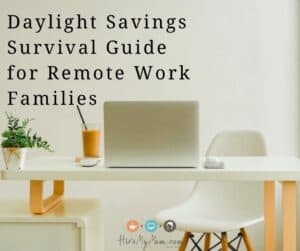The Best Sites to Find Remote Workers in 2025

As remote work continues to evolve in 2025, more small businesses are turning to freelance and contract professionals to scale efficiently and affordably. But with so many platforms available, how do you know where to find the most qualified remote workers?
In this guide, we’ll walk through the best sites to hire remote workers in 2025 and explain why HireMyMom.com stands out for small businesses seeking reliable, vetted, and mission-aligned talent.
Why Remote Hiring is Booming in 2025
Remote work is no longer a trend—it’s the new normal. According to a 2025 report from FlexJobs, over 58% of U.S. businesses now hire at least one remote team member. For small businesses especially, remote hiring offers:
- Cost savings on office space and overhead
- Access to a national talent pool
- Improved employee satisfaction and retention
- Greater flexibility for project-based or part-time work
But finding the right talent matters. Let’s explore the top sites available and how they compare.
Top 5 Platforms to Hire Remote Workers in 2025
1. Upwork
Upwork is one of the most widely known freelance marketplaces.
Pros:
- Huge selection of freelancers in various categories
- Built-in tools for time tracking and invoicing
Cons:
- High competition and lower quality control
- Time-consuming to sift through applicants
- Service fees and commissions can be costly
2. Fiverr
Fiverr is known for its quick-turnaround freelance services at all price points.
Pros:
- Great for one-off projects or small tasks
- Fast and easy to browse gigs
Cons:
- Time-consuming to sift through applicants
- Quality varies widely
- Not ideal for long-term support or professional or strategic roles
3. LinkedIn
LinkedIn offers a professional recruiting platform and access to passive job seekers.
Pros:
- Huge user base of professionals
- Good for connecting with experienced workers
Cons:
- Time-consuming to sift through 1000s of applicants
- Less structured for remote and freelance hiring
- Manual communication and vetting
4. Toptal
Toptal is a premium freelance site that advertises the top 3% of talent.
Pros:
- Rigorous vetting process
- High-quality candidates
Cons:
- High cost, often not suitable for small business budgets
- Time-consuming
5. HireMyMom.com
HireMyMom.com was created specifically to connect small businesses with skilled, U.S.-based women who work remotely.
Pros:
- Talented and invested professional candidates
- Focused on long-term, flexible roles
- Excellent customer support
- Family-friendly values
- Affordable, straightforward pricing
Cons:
- Smaller pool than general marketplaces (but more targeted and higher quality)
Post a Job Today to access qualified remote professionals for your business.
What Makes HireMyMom.com Different?
At HireMyMom.com, we aren’t just another freelance job board. We are a mission-driven platform that exists to support both small businesses and work-from-home professionals—especially women who want to thrive in flexible careers.
Our platform offers:
- A curated community of experienced, North America and U.S.-based remote workers
- Personalized Concierge Hiring Services if you want us to find your perfect match
- No junk or spam applications
- A trusted, values-aligned network
When you post a job on our site, you’re not just filling a role. You’re helping a woman achieve a better work-life balance and helping your business grow.
“We found an amazing executive assistant through HireMyMom who’s become a key part of our team. The quality and commitment blew us away.” — Laura M., Tech Startup Founder
Explore Our Job Posting Options or learn more about our Concierge Service today.
How to Choose the Right Platform for Your Business
When evaluating the best platforms to find qualified remote freelancers for small businesses, consider these questions:
- Do the candidates understand small business needs and US business culture?
- Are they in or near my time zone?
- How much time will I spend sorting resumes?
- What is the true cost, including time and service fees?
Platforms like Upwork and Fiverr may give you volume, but HireMyMom gives you quality, commitment, and alignment with your values.
Common Hiring Questions
How long does it take to hire on HireMyMom.com?
Most employers find qualified candidates within 7-14 days. With our Concierge Service, we can save you significant time and frustration in trying to find the right fit for your business.
What types of roles can I post?
Common job categories include Virtual Assistants, Social Media Managers, Copywriters, Bookkeepers, Marketing Specialists, Customer Service Reps and more.
Are your candidates based in the U.S.?
Yes. Most of our professionals are U.S.-based and typically have prior remote work experience.
What does it cost to post a job?
We offer flexible packages to meet every budget. View our current pricing on the Post a Job page.
Let Us Help You Hire the Right Remote Professional
If you want to:
- Save time vetting candidates
- Find someone who will care about your business
- Avoid the overwhelm of large job platforms
Then HireMyMom.com is your solution.
Click here to post your job now or choose our white glove, done for you hiring with our Concierge Service.
Stay in the Know
Want remote hiring tips and insights delivered straight to your inbox?
Sign up for our free newsletter and get weekly tips, job market updates, and success stories from small business owners like you.
Final Thoughts
In a crowded online hiring market, it’s easy to get lost. The key is not just finding talent—but finding the right talent. When you work with HireMyMom.com, you’re partnering with a platform built for small business success.
Let us help you hire remote workers who are qualified, committed, and aligned with your values.
Start Hiring Today! We’d love to help!






